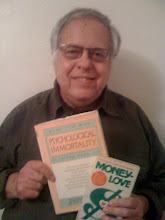Life is really amazing, sometimes downright unbelievable in the ways everything comes together or comes full circle.
Take antioxidants and longevity. I actually was one of the very first laymen to write about free radicals and how they could be countered by antioxidants. This came from the many prominent scientists I interviewed for my 1981 book, PSYCHOLOGICAL IMMORTALITY. This was about using your mind to extend your life, but the first third of the book was devoted to the science of longevity. My premise was that people were not going to be able to take advantage of the biological opportunities science would bring if they kept telling themselves they would be old at 65 and dead by 80.
Among the scientists I interviewed is one whose name prominently appears in some of the XOCAI literature.
The interesting thing, and maybe not surprising, is that many of these longevity researchers are still going strong almost thirty years later. Dr. Richard Cutler was, in 1980, doing his research at the Gerontology Research Center, which came\
under the jurisdiction of the National Institute on Aging. This is what I wrote in 1981:
"Free radicals is the term applied to a specific type of molecules. As Dr. Richard Cutler mentioned, free radicals are a by-product of the metabolism of oxygen. They are called free radicals because they are unattached and unstable fragments which zip around the body tissue, entering into reactions with other chemical compounds. These free radicals are thought to be responsible for a lot of so-called cellular garbage. Dr. Denham Harman of the University of Nebraska believes the critical factor in aging may be lipid peroxidation, which involves the formation of certain nonfunctional molecules when free radicals react with unsaturated fatty acids. This results in lipofuscin being produced, a fatty pigment which can take up over 30 percent of the cellular space, leading to an unstable and not very healthy situation. Dr. Harman contends that compounds called antioxidants, which inhibit free radical damage, may be able to slow the aging process. Studies have shown that high doses of antioxidants given to laboratory mice may protect them against cancer and certain aging processes. It apparently will be several years before any sort of antioxidant drugs will be available for humans in the high doses that seem necessary for results."
I can't even begin to imagine what I would have thought back in 1981 if someone had told me that approaching the second decade of the next millenium, I would be talking about and marketing those necessary high doses of antioxidants in the form of three small squares of exquisite-tasting dark chocolate. As I said, life is amazing. And let me clarify something here. I was not the prescient one, mentioning free radicals and antioxidants so many years ago. I hadn't heard of either before interviewing the longevity scientists. They were definitely ahead of their time, and probably still are. Just as those of us involved in sharing the healthy dark chocolate story are ahead of the wave that is surely coming, when everyone will wonder why they didn't know about and start taking this astoundingly delicious health food jam-packed with all the high doses of antioxidants any longevity scientist could ask for.
Jerry Gillies
(For more on this healthy dark chocolate and how you can get a taste and get
involved with my prosperity team, contact me at: jerrygillies@gmail.com)
Friday, December 12, 2008
Subscribe to:
Post Comments (Atom)

No comments:
Post a Comment